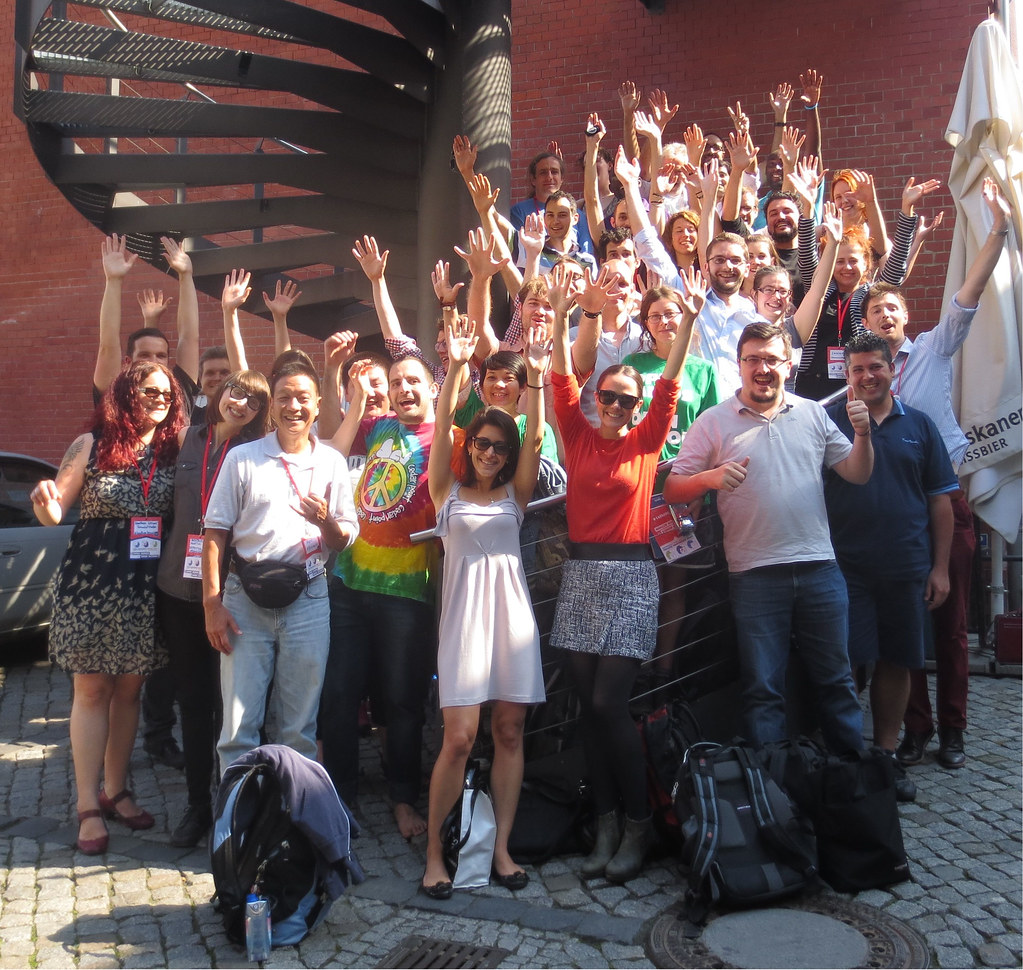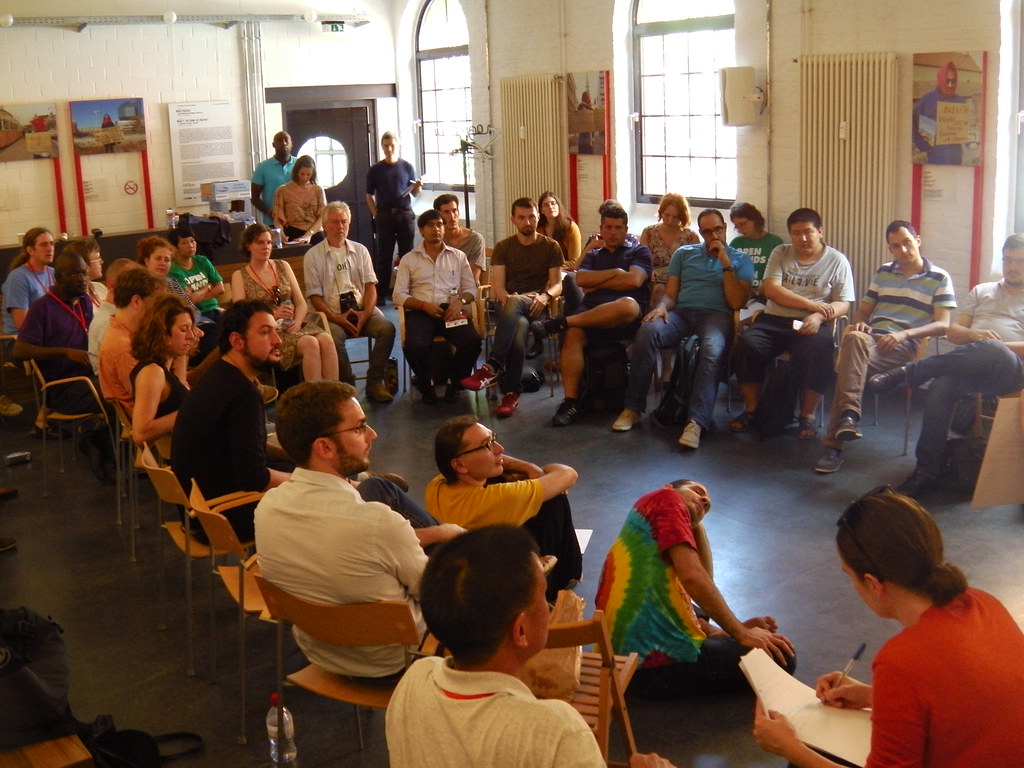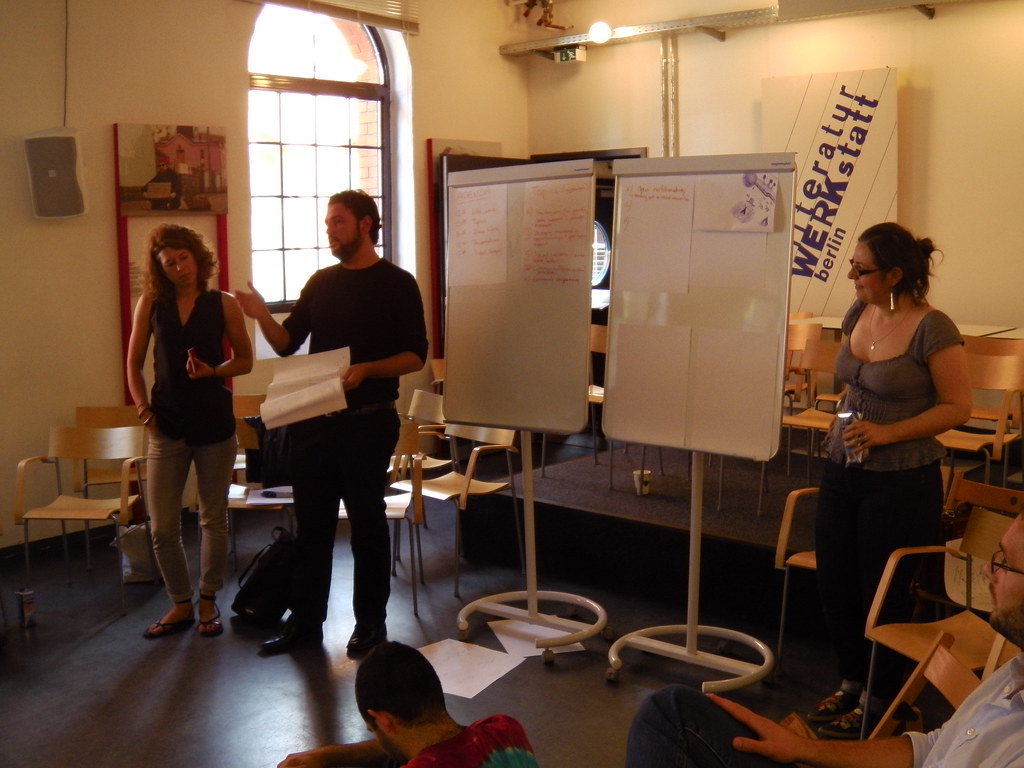Photo by Heather Leson, CC-BY-SA
Two weeks back, over 1,000 people gathered in Berlin to co-create the future of the open knowledge movement. Even before OKFestival had officially kicked off, over 50 people from over 25 countries piled into a crowded, hot room on a glorious Berlin afternoon, to work through the pressing issues, opportunities and challenges facing the Open Knowledge community.
Over the course of three hours we talked about how to develop better peer to peer mentorship across our global network, how to ensure the sustainability of emerging local groups and Chapters & took a close look at what exactly we are – are we a movement, are we an organisation, are we a community?
These questions could never be completely answered in one three hour session but we did make some exceptional progress and observed quite a few common themes emerging – themes also to be witnessed over the course of the following festival as well!
Sharing Knowledge
As a concept, open knowledge is all about sharing knowledge but it seems that, as a community, we still have some way to go in exemplifying that ideal. During the community summit, we discussed how we could share knowledge about fundraising between Open Knowledge and Local Groups, how our Local Groups could better share their experiences and teach each other. We also were introduced to Open Steps, a fantastic initiative by two community members who spent the past year traveling the world and documenting the open knowledge movement along the way. They are now developing a directory that would allow us to map where people are working on open knowledge activities to facilitate partnerships and knowledge sharing beyond already established networks or country lines.
Photo by Christian Villum, CC-BY-SA
Peer mentoring and skillshares
Another significant topic on the agenda was the discussion of how we could better transfer skills and know-how between newcomers and more experienced members of the community. There are already a series of initiatives pursuing these goals, for instance the series of Community Sessions hosted by Open Knowledge Central – as well as the regional calls organized around the world by members of the community.
It was clear though that one of the main missing pieces in the puzzle is the facilitation of more day-to-day based mentoring, peer to peer, perhaps only involving 2 people – the mentor and the mentee – and also something that stretches over a longer period rather than being limited to a single session on Skype or a Hangout. Additionally one barrier that was very clear was the fact that people are living far apart, often having many time zones in between them, therefore prompting a need to rely on online tools – not only for communicating, but also to find each other and identify who to talk to. These are challenges that we, as a community of which Open Knowledge Central is also a part, will look much more into over the coming weeks and months. Lots of ideas are already brewing and a handful of community members have dedicated themselves to sketch out a plan for a mentoring program.
Open knowledge in the Global South
A growing portion of the global community are based in what can be referred to as the Global South and therefore have some additional needs and challenges as compared to countries in more structured environments. As it was noted, some members of the community even operate in areas that can be considered downright hostile. Oppressive governments, corrupt civil servants, failing IT-infrastructure, cultures of domestic oppression, language barriers (highlighted by the high level of anglo-fication characterizing the open knowledge field) and even illiteracy are just some of the factors that make up for a very different playing field for some open knowledge advocates, and in such cases peer support, resource/skill sharing and even funding becomes of increasing value and significance. We need to collaborate to localize key documents across languages, provide toolkits in downloadable and remixable online formats, challenge gender roles, move beyond Internet-driven activism and put international pressure on governments that work actively to hinder the free gathering of people in these regions.
Photo by Christian Villum, CC-BY-SA
Community Identity & Re-branding
During the discussions we also revisited some of the discussions had earlier in the year around some of the branding/visions/values/strategy-related updates brought about by the central Open Knowledge organisation. It’s clear that more community consultation is needed around changes in such basic foundations, but what appeared during these face to face chats was also an understanding that some of the discontent and frustration put forward by parts of the community was rooted not only in these concrete issues, but also in some of the more deeper challenges of the community and organisation: For instance, how do we perceive ourselves as the community grows and grows at an almost explosive rate? What is our identity? The small family is growing into the thousands and the dynamics that used to be are clearly being replaced by others. Does it need to be that way? Can we avoid it? And if not, how do we cope with it and ensure the same level of transparency across the community and the organisation? We also need to define more clearly what the role of the Local Groups, the Working Groups and the Chapters – the most formal part of the community – is in this new reality of an increasingly larger body of people all associating themselves with our shared cause. This is clearly a conversation that will continue way beyond this community summit, and rightfully so!
We are currently writing up all the notes and will put them on the wiki as soon as we have collated them all. Jump on board and comment if you have thoughts or ideas!











